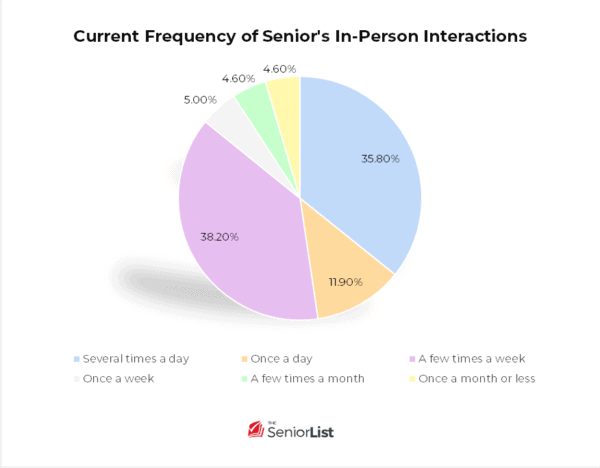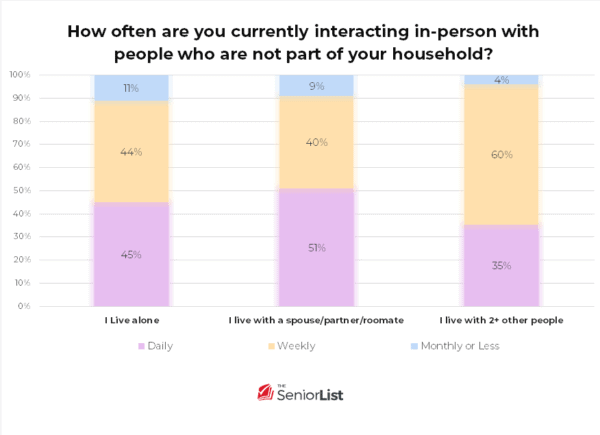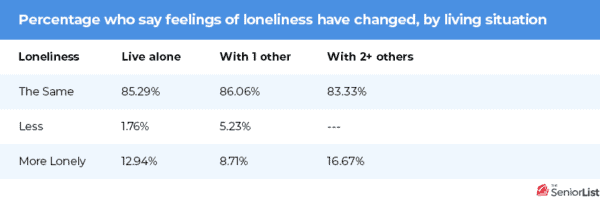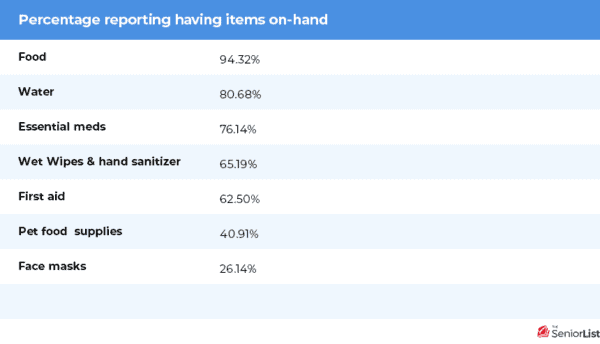By Amie Clark and The Senior List Team | Last Updated: March 17, 2020
To understand how seniors’ lives are impacted by the spread of COVID-19, social distancing, and broader societal and lifestyle impacts, we asked our community of tens of thousands of seniors. We received more than a hundred responses from March 13th to 16th and you can read some of their personal stories in the bottom section of this article.
In addition, we asked more than 1,000 American adults on how their habits have changed since the outbreak began in the U.S., as well as their level of preparedness and access to healthcare. The survey was conducted in two parts — one survey polled 500 adults on emergency preparedness, and the other questioned adults 65 and older on their level of interaction with other people in the face of recommendations that call for social distancing.
This will be part of an ongoing, weekly series we will be publishing for the foreseeable future.
Here’s a summary of the key findings:
- As of this past weekend, about half (52%) of older adults aren’t interacting with people outside their household on a daily basis.
- Seniors who live with others (3 or more people) have less interaction with people outside the home that those that live alone or with a partner or spouse.
- The great majority of seniors (85%) do not feel any more or less lonely since the outbreak. As of this past weekend, approximately 1 in 10 seniors say they are feeling lonelier since the COVID-19 outbreak.
- Most seniors have adequate supplies of food, water, and necessary medication, but few have things like face masks. So far, most seniors report health care workers being as available as before or more accessible.
Social Distancing & Loneliness
Social distancing, or the practice of staying at least six feet away from other people, is recommended as a way to reduce the spread of the virus. Our survey found that after the first weekend of the national emergency declaration over COVID-19, about 52% of seniors aren’t interacting with people outside their household on a daily basis.
Household size has an impact on the likelihood that a person will interact with people outside their household daily, and larger households, at least so far, are doing the best with adopting social distancing practices.
Less than half of those who live with just one other person, whether a spouse, partner, or roommate, are practicing social distancing, but nearly 2 in 3 who live with at least two other people are interacting with outside people less regularly.
While older adults may be at greater risk from COVID-19, even before the virus, this age group had another potentially harmful condition to worry about — loneliness. So far, most older adults haven’t seen their loneliness quotient rise, but as local, state, and federal recommendations shift, that could very well change. Still, more than 1 in 10 older adults say they feel lonelier than they did before, and there is some evidence to suggest that social distancing is increasing feelings of loneliness.
About 86% of seniors say their feelings of loneliness haven’t risen, and only about 4% have become less lonely as the COVID-19 has deepened.
Notably, the group most likely to report that they feel more lonely now than they did before the outbreak are those who live with two or more other people. This is also the group most likely to report lower frequency of in-person interactions with individuals outside their households. In other words, the group most employing social distancing is also the group most likely to say they feel more lonely.
Among the suggestions for fighting the feelings of loneliness that are likely to spring from social distancing and self-isolation is regular online communication with others, but our survey suggests that’s a less effective tool.
In fact, nearly three-quarters (72.3%) of those who communicate online with others on a daily basis say they feel more lonely today than they did before the outbreak.
Access to Healthcare
Fortunately, few seniors so far have said they are finding it more difficult to access healthcare services — about 86% say their healthcare providers are as accessible today as they were before the outbreak, and 8.5% say their doctors, nurses, and health aides are actually more accessible.
Quarantine Preparedness
Few older adults report being unprepared for long periods of isolation. In fact, about 87% say they feel at least somewhat prepared. Food, water, and medicine were the most common preparedness items that seniors reported having available during a quarantine.
What Should You Do?
Many local and state governments have issued their own recommendations for how older adults should adjust their daily routines to ensure they don’t needlessly risk exposure to COVID-19, and those guidelines are usually based on current confirmed infection and death rates, so they are likely to represent the best possible advice for each individual.
Additionally, the federal Centers for Disease Control and Prevention recommends older adults and those with serious chronic conditions, including heart disease, diabetes, and cancer, take the following steps to protect themselves:
- Stock up on supplies when it is safe to do so, meaning when your local stores are less crowded; alternatively, if stores in your area offer it, opt for curbside pickup or delivery of needed items.
- If you must go out in public, maintain a safe physical distance between yourself and others, reduce close contact, and wash your hands often.
- Avoid all non-essential air or cruise travel, and remain home as much as possible.
About This Report
Our data comes from three surveys conducted March 13-16, 2020. One was an e-mail sent to tens of thousands of The Senior List readers. The second surveyed over 500 American adults, a segment of whom were 60 and older, on their emergency preparedness. The third surveyed over 500 seniors 65 and older about their current level of in-person interactions with others, including healthcare providers, current changes to their lifestyles due to COVID-19 risks, and feelings of loneliness.
Stories From Our Community
We asked our community to share some stories about how their lives have been impacted by COVID-19 and social distancing. Here are selected responses from the hundreds received from March 13-16, lightly edited for grammar and clarity.
| Staying Positive | |
|---|---|
|
J.T. |
“I am a senior with an underlying health condition, and I am very afraid of the coronavirus. I quit my part-time job because it had hundreds of tourists daily. I have pushed down my feelings of panic by focusing on action plans. On the bright side, I am cleaning and organizing my house and yard! That’s the positive part of this mess. Look for the silver lining.” |
|
H.M. |
“I guess I’m weird, but I’m not getting shook up about this virus. People seem to love to have something to worry about. Just use common sense and don’t go into a tailspin.” |
|
J.S. |
“Other than buying some extra supplies and avoiding large groups of people, the virus has had no impact on my life. It’s not the end of the world. The sun will still come up tomorrow. Soon life will go on as normal and the panic will be over.” |
|
C.H. |
“This virus has not impacted my life. I hardly go out around crowds anyway, so I just stay in my son’s home and go outside to see all the pretty flowers that have opened.” |
|
L.P. |
“I’ve been doing a lot more handwashing during the day. I’m trying to stay well-rested and hydrated to keep my immune system happy!” |
| Relying on Faith | |
|---|---|
|
S.W. |
“My mom is almost 97. She has several underlying health conditions, and she is very frail. We know her life and death are in the hands of God. She does not worry about the virus because it may be her ticket to heaven. That may sound harsh, but she fully believes she is long ready to go. We are just going on with life as we know it.” |
|
R.P. |
“I trust in Jesus. Our Heavenly Father is the Great Physician. I have lived through many flus and viruses.” |
|
R.H. |
“The coronavirus hasn’t impacted me at all. I’m still doing everything as I always have. My God has not given me a spirit of fear.” |
| Dealing with Health Concerns | |
|---|---|
|
K.M. |
“The impact on my household is dramatic. I am 64 with an underlying health condition. I stay home unless I must go out, and I’ve been doing lots of hand washing. But mainly, it’s psychological stress; knowing that if I get the virus I will likely be very ill, perhaps even hospitalized, terrifies me. I also wrote a new will. The coronavirus has had quite an impact!” |
|
J.M. |
“The coronavirus has caused major disruptions for my family. My husband needed a pacemaker implanted and we were very anxious about him being in the hospital for such a serious procedure. My husband and I are seniors. He has diabetes and heart issues, and I have asthma and COPD. Very scary times.” |
|
K.K. |
“Although COVID-19 hasn’t become an issue in our town (South Lake Tahoe) yet, I’m sure it will. I’m very concerned about it, but my husband isn’t. He’s an optimist. I worry about one of us getting very ill because of our age (76) and because both of us have compromised immune systems. Our local hospital is also quite small, and I’m sure they aren’t prepared for anything major. All we can do is take care of ourselves and hope for the best, I guess.” |
|
S.S. |
“We are developing cabin fever, experiencing even more anxiety and fear than usual, having difficulty sleeping, and finding it hard not to watch the news. My husband is nearly 73 with an underlying condition, and he says he expects that the virus would kill him. At 65 with no underlying condition that I know of, I expect to make it through if I get sick, but I worry about contaminating my husband.” |
|
K.V. |
“It’s been hard. I’m 61 and at high risk. I have COPD, so I’m going to extreme measures to be extra careful! My husband and I live alone. He is 66 but in relatively good health. We do not have a car so our neighbor took us grocery shopping this morning. I think if people just use common sense and good hygiene we will be fine.” |
| Impact on Jobs | |
|---|---|
|
J.S. |
“I had a part-time job, and I have been laid off. I depend on that money to supplement my social security. My nest egg is gone, and I’m thinking of going back to work full time. I can’t sleep at night thinking about the loss of income and savings that I was depending on to help me through life.” |
|
A.S. |
“I have worked in a few assisted living communities for the past 7 years or so. I do an art class and a talk group. I am 73 and have Graves’ disease and hyperthyroidism. I don’t know whether I should go to work or just stay home. Some communities are on lockdown while the rest are not, and they expect me to be there to entertain people.” |
|
R.S. |
“So far, the virus has had little impact on me. The small business I work for is still open, and our church hasn’t closed yet. My adult kids who teach are both impacted. University campuses and school districts are closed for the semester here in Central California.” |
| Navigating the Crowds at the Store | |
|---|---|
|
P.C. |
“Reality has sunk in; people are in a panic it seems! I went and did my normal Friday morning shopping, and I was met with a store full of almost frantic shoppers. There was no toilet paper to be found. I plan to stay inside now and let the outside world do it’s thing. I’m a senior with leukemia, so staying away from public places seems like a good idea.” |
|
F.W. |
“I don’t think I’m overreacting, or at least I’m not filling my shed with toilet paper and hand sanitizer, but it’s scary. I did stock up on more frozen food than I normally buy. I’m staying home more than usual and changing things up when I do go out. I’m starting to feel a little stir crazy.” |
|
T.B. |
“I am the sole caregiver for my husband who is in remission from lung cancer and suffers from Parkinson’s disease. He’s confined to a wheelchair, so I pretty much do all hygienic care for him. Every month I buy cleaning supplies, tissues, etc. in bulk. Now I can’t find my supplies because people are hoarding them. It is so terribly frustrating because I use all these items daily. As a caregiver I am so upset because my days are long and tiresome.” |
|
L.T. |
“It’s hard to get to the store for food and other things that I need, especially because I take the bus and I am over 73. I’m just afraid.” |
|
N.R. |
“I’ve been trying to buy hand sanitizer but everywhere is sold out, so I’m staying home.” |




